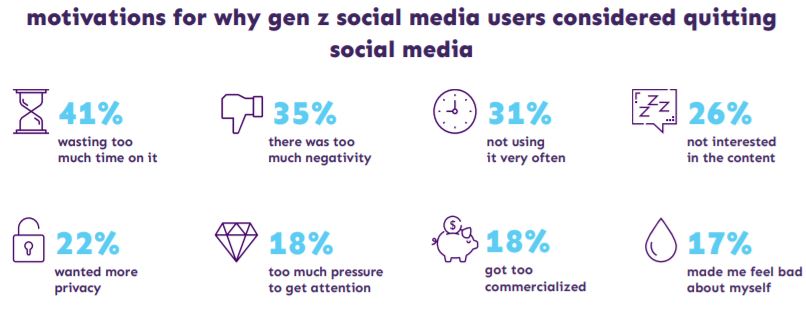At least once a week, a friend will announce that they’re taking a “social media detox.” They’ll deactivate an account (or at least delete an app) to avoid the negative feelings that too much social content can foster. I have never taken time off of social, but after falling into one too many late-night Instagram vortexes or stressing about a lack of likes, I can certainly understand the appeal. And according to a new study by Campaign, my generation isn’t the only one feeling the need to cleanse its social palette.
The study states that sixty-four percent of Generation Z is taking a break from at least one social media platform, while thirty-four percent is leaving permanently. This is contradictory to the image of Gen Z’ers as social media natives who grew up with the platforms and for whom social media is a strong sense of identity.
So why are today’s teens opting out of social networking? Largely because of the effect social media has on their mental health. Thirty-five percent of anti-social media users cited that there was too much negativity floating around, while seventeen percent said it made them feel bad about themselves. Social media is often linked to anxiety, depression, and low self-esteem, and eighteen percent said they felt too much pressure from sites to get attention.

Important for marketers to note is that twenty-six percent of respondents were bored by the content they were seeing. Generation Z is largely responsive to branded social content: Sixty-five percent of those who plan to remain on social sites do follow brand accounts, and forty-three percent reported making a purchase directly via social media. As the social media landscape changes with new updates and content formats, brands will be called upon to stretch their creativity to hold Gen Z’s attention.
Because even digital natives are choosing to step away from social media platforms, brands now have a business imperative, or even a social responsibility, to create content that promotes positive feelings in their audience, instead of negative, self-critical ideas. We should expect to see more social content that lifts our audiences up and gives them reason to keep scrolling through the site.
Editor’s note: This piece was originally published under the title “Why Xennials or Generation Z Are Disillusioned with Social Media.” It’s been changed to reflect the fact that Xennials and Generation Z are not synonymous.
Image by
Becca Tapert for Unsplash